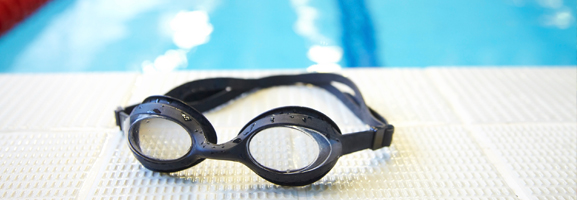How to choose the right swimming goggles

Wearing a pair of goggles when swimming is essential, but many people struggle to find the right fit to achieve maximum comfort and performance when in the pool.
If worn incorrectly, goggles can hinder progress and cause frustration in the pool. Follow Newitts' simple guide below on how to choose the right swimming goggles.
Why goggles?
The human eye was not designed to work underwater, so when we try to open our eyes under water our vision is blurred which can hinder our swimming progress.. Wearing goggles will ensure you have perfect vision throughout your swim without having to constantly re-adjust your focus. In addition, the chemical irritation from the pool treatment is enough to warrant goggles, even if you're an amateur swimmer.
Which goggles?
The type of water you swim in will affect the type of goggles you buy. If you are mainly going to swim in the ocean or open water, it is recommended that you opt for polarized swimming goggles. At Newitts we sell a range of Speedo Polarised Swimming Goggles which allow optimum peripheral vision if swimming in open water. If most of your swimming will be in a pool, you'll find many different styles and models available on our website that will be well suited to your needs.
Choosing goggles
There are four main areas you should consider before purchasing a pair of swimming goggles:
FIT
Your goggles should not only be comfortable, they should feel quite snug against the face, with the goggle straps tight around the head to prevent water from getting in. Most modern goggles now come with a double strap, and you can achieve a better fit by placing one strap higher than the other, to help keep the goggles in place. Both straps should be at the level of the eye or above, never below. Check the goggles are not too wide around the corners of your eyes as this could also cause water to leak in.
COMFORT
Comfort is one of the most important aspects when choosing a pair of swimming goggles. Your goggles might seal perfectly around your eyes, but if they chafe over the nose or apply too much pressure to your eye sockets, they can become a problem. Most modern goggles comes with an adjustable nose piece for maximum comfort. If you try on the goggles and the nose piece is too tight or rubbing against the bridge of your nose, try another pair on. Split straps are better at holding goggles in place, particularly if you'll be swimming fast or turning quickly in the water.
SIGHT
Choose goggles with an anti-fog coating and UV protection. Coated lenses are better because you won’t need to defog them as often. You can also purchase prescription goggles otherwise known as Optical Swimming Goggles that help you to see clearly in the water if you require lenses or glasses.
COLOUR
Consider the colour of the lens within the goggles. Most swimmers opt for lighter coloured lenses, but if you regularly swim outside or in bright environments, dark lenses can be preferable. There are six common colours of goggle lenses described below:
Clear – Clear lens goggles are designed for indoor use and designed for low light, overcast conditions where maximum visibility is required.
Lilac – Lilac lens goggles are designed for indoor and outdoor use and provide the best contrast for objects against a green or blue background.
Smoke – Smoke lens goggles are best suited to outdoor swimming in sunny conditions, designed to reduce light transmission and lower overall brightness.
Amber – Amber lens goggles are suited to indoor and outdoor use. If you struggle to see the bottom of the pool, amber lenses are designed to filter the light to crisp up your view.
Blue – Blue lens goggles are suited to both indoor and outdoor use and are designed to allow a moderate level of light into the eye but maintain protection from glare in bright conditions.
Mirrored - Mirrored goggles are for outdoor use and designed to reduce brightness and glare.
3 simple tests to find the perfect goggles
It is highly advisable to try on goggles before you purchase them. Below, Newitts lists 3 tests you can perform to find the perfect goggles to fit.
1. Leave the straps off, and push the lenses against your eye sockets to gain a quick idea about whether the lenses will be comfortable enough to be worn for an hour or two at the pool. Lenses padded with gaskets made of foam rubber or silicone will be more comfortable.
2. Push the lenses further against the eye sockets then release them. The goggles should stick on your face for a few seconds due to the suction, even with the straps off. If the goggles do not stick and simply fall off your face, it is likely they will leak in water.
3. If the goggles pass the above two tests, put the straps back on and see if the goggles still feel comfortable. Check the lens doesn't suck too much on the eyes, and check for a double strap which can be adjusted to achieve maximum comfort.
Always try goggles on before you buy, and if you're buying online, check the retailer will offer a full refund if they don't fit. Newitts offers customers a full refund up to 28 days after purchase.
